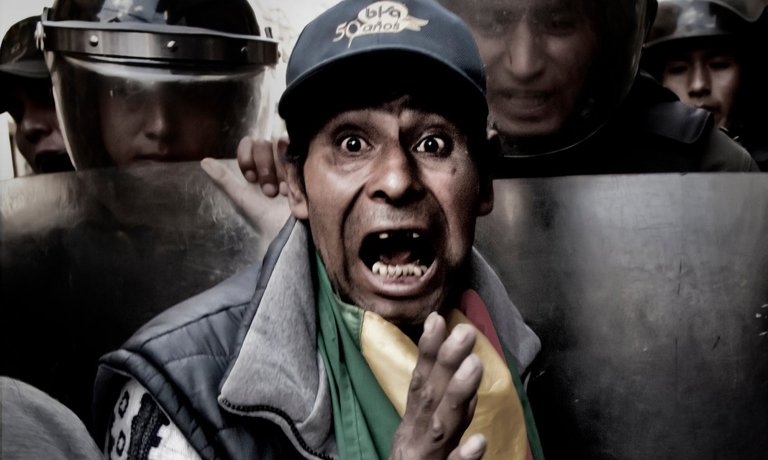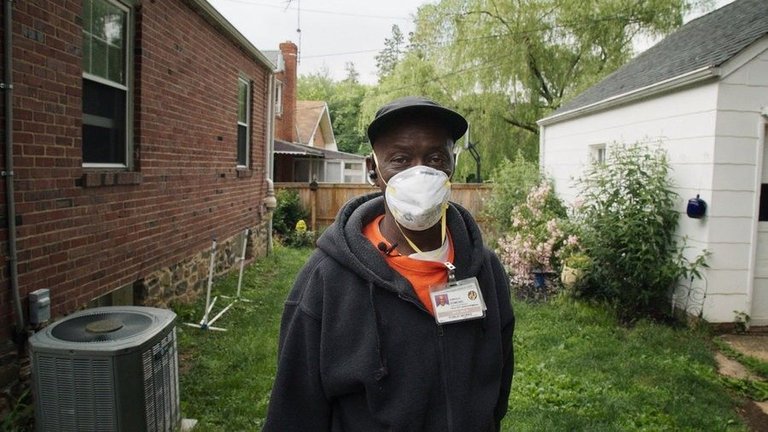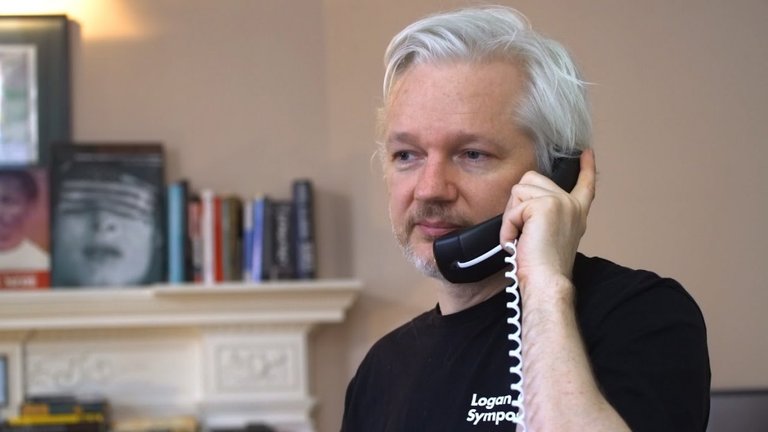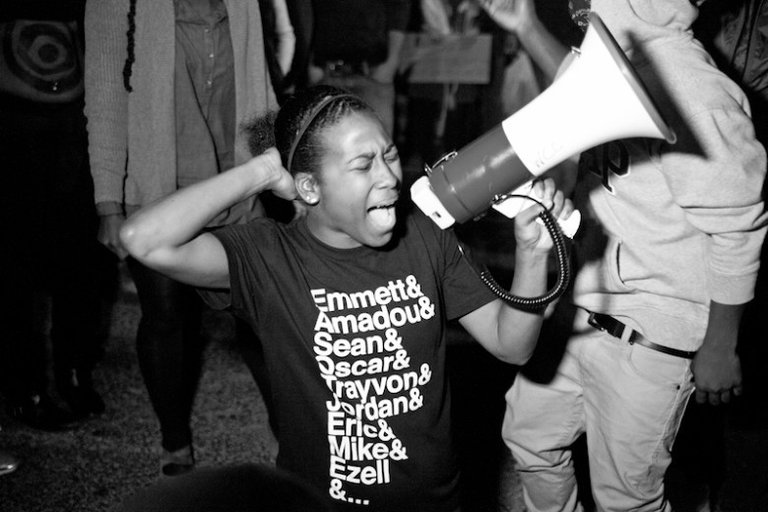I want to share with you this great article that No Film School has compiled. It's a list of 10 most politically explosive documentaries from this year.
In their words:
In our choosing, we attempted to include films addressing a diverse slate of topics across all regions—we could have had a full list focused exclusively on the current Syrian Civil War, for example— that were more contemplative in their approach than damning.
1. The Fight
Directors: Violeta Ayala and Dan Fallshaw

There are few more brutal scenes to imagine than a gang of police in riot gear beating unarmed disabled people in wheelchairs. Sadly, that’s exactly the image that opens the gripping short documentary The Fight. The film follows a group of disabled activists in Bolivia journeying across the country in wheelchairs and on foot for 35 days, followed by a 3-month vigil outside the capitol building in La Paz. Their peaceful protest is an attempt to bring government attention to their cause: an ask for around $50/month pension to allow disabled people to “live with dignity.” The group is met with, at best, silence, and, at worst, almost unspeakable acts of violence on behalf of the government guards and police. Although international attention to the documentary helped force the government to meet some of the protestors’ demands, it also garnered death threats to the filmmaking team and their families.
You can watch The Fight here. Short docs often cover the most urgent issues because they can be faster to turn around. To immerse yourself in the most pressing stories of the day, look for other short nonfiction published by The Guardian, The New York Times, The Atlantic, and Field of Vision. —Liz Nord
2. The Force
Director: Peter Nicks

In some ways, The Force picks up where Ryan Coogler's 2013 Sundance-winning breakout hit Fruitvale Station left off. His film was based on the true story of Oscar Grant, an unarmed black man shot by police in Oakland, CA. Although those were police-for-hire by the public transit system and not the Oakland PD depicted in The Force, the riots that ensued after Grant’s death highlight the tension between Oakland law enforcement and its local population.
With impressive access, The Force begins by documenting the embattled Oakland police department in 2014, at a time when the department is being federally monitored for misconduct and civil rights abuses, and police around the country are being scrutinized and held to account by the Black Lives Matter movement. Without providing answers, the film gives us vérité glimpses of just how complex and emotionally charged the issues surrounding modern policing are. The film joins the canon of important contemporary works (like Whose Streets, also on this list) detailing this country's acute and increasingly deadly challenges around race and law enforcement. —Liz Nord
3. Forever Pure
Director: Maya Zinshtein

Any documentary about Israel has the potential to be volatile, but when Maya Zinshtein turned her lens on particularly passion-fueled arenas—soccer and Jewish-Muslim relations—it was sure to light a powder keg. Rather than point out social injustices in faraway lands, the Israeli filmmaker is the type of brave storyteller who confronts her own country’s dark underbelly. The film documents notoriously racist soccer club Beitar Jerusalem—the only team in Israel’s premier league never to sign an Arab player—after it gets bought by a Russian oligarch who brings two Muslim players from Chechnya into the lineup to serve his own business needs. The results of this decision reveal some hard truths about race, class, and politics in Israel, and Forever Pure gives us the best seat in the stadium. —Liz Nord
4.Icarus
Director: Bryan Fogel

Although it may prove less of a shock in 2017 to realize that Russia enjoys tampering with the results of highly publicized competitions, filmmaker Bryan Fogel had no idea what he was getting into when he outlined Icarus. The film begins as a slick documentary about the effects of steroid use in cycling, following the filmmaker, an amateur cyclist interested in how disgraced athletes are rarely caught doping (it was colleague testimonies that turned Lance Armstrong in, after all), as he becomes his own drug-enhanced test subject.
The movie then becomes a more global exposé. Working with Dr. Grigory Rodchenkov, a urine-obsessed lab director at Russia’s athletic anti-doping facility, Fogel dives deep into how athletes (and governments) work hard to suppress news of their illegal, chemically-enhanced activities. But as Rodchenkov publicly reveals more information to The New York Times about his native Russia’s cover-ups and vehement denials, Icarus transforms into a courageous tale of whistleblowers who dare threaten their country’s pride. The result? Rodchenkov resides in the Witness Protection Program and all Russian athletes have been banned from participating in the 2018 Winter Olympics in South Korea.—Erik Luers
5. I Am Not Your Negro
Director: Raoul Peck

When Raoul Peck set out to revisit the work of civil rights leaders Medgar Evers, Malcolm X, and Martin Luther King, Jr, through the writings of their mutual friend James Baldwin, he might not have realized how necessary and timely that revisitation would be. Although all of the film’s subjects have left this world, their struggles feel as contemporary as ever—a fact which places I Am Not Your Negro among the year’s most urgent documentaries. An Academy Award nominee for Best Documentary Feature, the film weaves together an enormous trove of archival footage from contemporary American life with narration of Baldwin’s pointed observations voiced by Samuel L. Jackson. Ultimately, for an American audience in the throes of an identity crisis, the film embodies one of Baldwin’s most famous quotes: Not everything that is faced can be changed, but nothing can be changed until it is faced. —Liz Nord
6. The New Radical
Director: Adam Bhala Lough

The New Radical begins as an exploration of ethical considerations around the free distribution of instructions for a 3D-printable gun on the internet, with an introduction to the man behind the movement, American-born Cody Wilson. Soon, this intertwining story of two members of a new generation of cyber anarchists—Wilson and British-born Bitcoin expert Amir Taaki—becomes a gripping thriller. The documentary contains the real-life versions of everything you’d expect from a sci-fi narrative: punk squatters, drugs being sold on the dark web, crypto-currency, et. al. There’s a sub-world that we suspect might exist, and this film reveals that it actually does. The protagonists are young and relatable, and, like many idealists, their philosophies become darker and more militant as time goes on. As their tales unfold in the documentary, some chilling questions are raised about who really controls the future. Ultimately, are we better off in the hands of radical cyberhackers or corporate-controlled governments? —Liz Nord
7. Rat Film
Director: Theo Anthony

Don't be dismayed by its title: Rat Film is no mere exploration flick looking to shock and disgust. Challenged by its lofty sociological ambition and century-spanning thesis, the debut feature from Baltimore resident Theo Anthony is as inspired by Emile Durkheim as it is Chris Marker. While it's no secret that red-lining and racial segregation have been prevalent in Charm City for several decades, its extreme rodent problem in its most impoverished neighborhoods may be less known. What if there were a connection between the two?
Surveying Baltimore's long history with rat infestation and Johns Hopkins University's morally questionable attempts to curb it (through, it's implied, practices mirroring eugenics studies), Anthony makes clear that the city's vermin epidemic stems from its desire to exterminate or severely disable its most economically deficient; the discarded men and women—primarily African-American— are left to deal with the issue. What follows is an 83 minute thirst for knowledge filled with anthropomorphic comparisons, philosophical asides, and mordant humor. It's one of the most impressive debuts of the year. —Erik Luers
8.Risk
Director: Laura Poitras

It’s been fascinating to witness how the public perception of Wikileaks, the notorious website that releases private state documents freely and with global consequence, changes depending on the private life of its founder, global hacker Julian Assange. Can you respect the institution without adoring its leader? Risk, the new film from Laura Poitras made before and after she shot her Oscar-winning, Edward Snowden-led Citizenfour, makes a good case for why Assange’s morally-ambiguous, ego-driven vendettas are as newsworthy and important as his public quest for altruistic transparency.
What begins as a fly-on-the-wall document of a rebellious hacker working with his team to put out potential “fires” and promote the right to a free internet descends into a subjective profile of a potential criminal-in-hiding, equally paranoid and power-hungry, inclusive and sexist. As stories of sexual misconduct continue to plague Hollywood, Risk draws light on the rampant abuse taking place within the “hacker community,” and Poitras’s production journals, read in voiceover, help illustrate the moral dilemma the filmmaker felt as her subject grew to view her as more of a threat than an ally. Still residing in London’s Ecuadorian Embassy for fear of extradition to Sweden over rape accusations he deems a liberal feminist agenda, Assange’s power continues to grow. —Erik Luers
9. VICE News Tonight —Charlottesville: Race and Terror
Elle Reeve, Correspondent, and Zach Caldwell, Director of Photography

The common protest phrase "whose streets?" is repeated several times in Charlottesville: Race and Terror, a short doc from the VICE News Tonight team about the contentious, violent outburst that arose over the proposed city removal of a Confederate Robert E. Lee statue in Virginia last summer, but unlike the feature discussed at number 10, here "whose streets? Our streets" sounds more like a proposed threat than a cry for help.
As VICE's Elle Reeve and her team arrived in Charlottesville to document white nationalists descending upon the city to protest the removal of the statue, what their cameras witnessed were members of Unite the Right storming toward the monument with burning TIKI torches and fiery anti-Semitic chants. The documentary crew followed the weekend's action as Neo Nazis and anti-hate groups protested against one another throughout the city, resulting in the hit-and-run death of anti-violence advocate Heather Heyer by a member of the alt-right. As a result, the President of the United States decided to claim that there was violence on both sides.
Realizing early on that the best way to make the alt-right look as horrific as possible was to let them speak for themselves, Reeve and her crew met with vocal leader Christopher Cantwell at rallying picnics, in vans on the run, and in hotel rooms, letting him spew his brimstone-burning views of society. Depending on your stomach, you will be appalled and bewildered as Cantwell recaps the weekend as a success and victim-blames those left injured or killed. Does he support the President? Somewhat, but, as he makes abundantly clear early on in the film, he's no fan of the religion of Trump's son-in-law Jared Kushner. —Erik Luers
10. Whose Streets?
Director: Sabaah Folayan

Director Sabaah Folayan and Damon Davis’s Whose Streets? places us in the midst of a social movement in the very moment its significance was being threatened. With the abundance of media attention the Ferguson, Missouri protests received in the summer of 2014, it was alarming how little of the story was being told by those directly affected by it. Jumpstarted by the murder of Michael Brown, an unarmed African-American teenager fatally shot by police officer Darren Wilson (who was never charged with any wrongdoing), residents took to the streets to voice their anger and preach a safer existence for the African-American population. Emotions were rightfully running high.
As a result, the event was deemed a national emergency, and out-of-town military arrived in tanks and helicopters to intimidate with canines and tear gas. While the news media vilified the protestors by spotlighting random acts of rioting and looting of local businesses—Fox News chose to draw curious attention to the substances they believed the protestors were consuming—few were documenting the individual voices of the protestors themselves. Whose Streets? tells a story through the eyes of the people, cleverly inserting social media usage and camera phone footage employed while the nightly confrontations were taking place.
Emphasizing a renewed sense of urgency and constitutional change, Whose Streets? is as much historical artifact as it is an action item for youth destined to be wronged again. As the film’s closing moments indicate, our children will continue to amplify our voices. —Erik Luers
This is a fantastic selection of movies. In recent years I've grown fond of the documentary formula of film making, especially when it's used as a means of bringing social issues to light. I think documentary films are a form of the medium that comes closest to truly being art with how it bridges the audience with issues about their world and their own humanity.